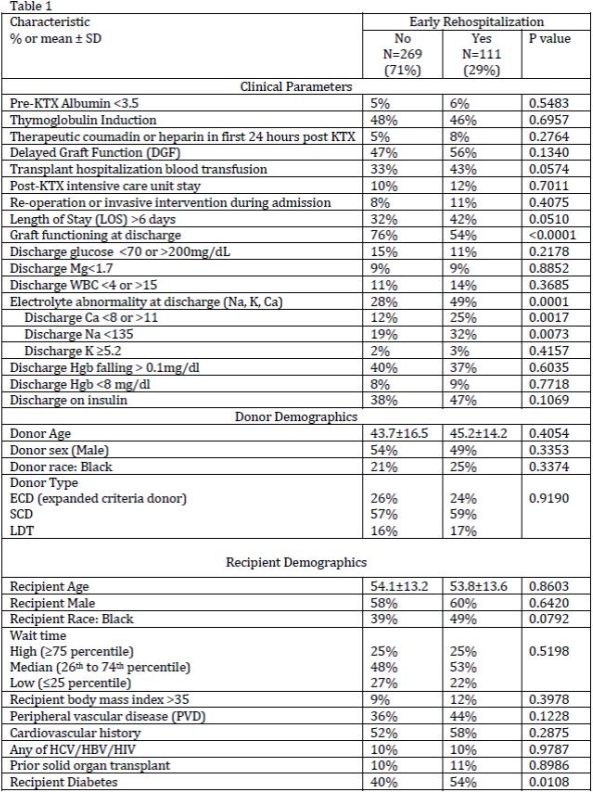Early Hospital Readmissions After Kidney Transplantation
Transplantation, Montefiore Medical Center, Bronx, NY.
Meeting: 2015 American Transplant Congress
Abstract number: 199
Keywords: Kidney transplantation, Outcome, Resource utilization
Session Information
Session Name: Concurrent Session: Kidney: Hospitalization/Readmission
Session Type: Concurrent Session
Date: Monday, May 4, 2015
Session Time: 2:15pm-3:45pm
 Presentation Time: 2:15pm-2:27pm
Presentation Time: 2:15pm-2:27pm
Location: Room 118-AB
Early rehospitalization after kidney transplantation is common and is considered a quality metric. Few studies have examined preventability or specific transplant/discharge factors associated with early rehospitalization.
We performed a single-center, retrospective cohort study between 2011-2014 of adult kidney-only transplant recipients (KTX) excluding cases with graft failure or death during transplant hospitalization. A transplant surgeon/nephrologist team reviewed all rehospitalizations within 30 days of discharge for (1) primary reason and (2) preventability. Preventability was criteria based and characterized by type: (a) clinical issue present at discharge (b) outpatient diagnostic/therapeutic procedure unavailable and (c) potentially treatable as outpatient.
Of 381 KTXs, 29% were rehospitalized. Causes for rehospitalization were GI disturbance (18%), graft dysfunction (19%), infection (17%), surgical complication (17%), electrolyte abnormality (12%), and hyperglycemia (6%). Of rehospitalizations, 41 % were deemed preventable due to nonavailability of diagnostic/therapeutic procedure (41%), clinical issue present at discharge (11%), and potentially treatable as outpatient (26%). On univariate analysis, risk factors for rehospitalization at an α level < 0.2 were recipient diabetes, black race, PVD, DGF, blood transfusion, LOS > 6 days, and graft function, electrolyte abnormalities or insulin at discharge. On multivariate analysis, electrolyte abnormality at discharge was associated with readmission (aOR 2.0, 95%CI 1.2, 3.4) and kidney function at the time of discharge was significantly protective (aOR 0.5, 95%CI 0.3-0.9); however other characteristics were not significant including recipient black race (aOR 1.5, 95%CI 0.9-2.5), diabetes (aOR 1.5, 95%CI 0.8-3.8), PVD (aOR 1.1, 95%CI 0.6-1.9), blood transfusion (aOR 1.4, 95%CI 0.8-2.2), DGF (aOR 0.6, 95%CI 0.3-1.1)and discharge on insulin (aOR 0.8 95%CI 0.4-1.6),.
The preventability of readmission is high especially with increased availability of outpatient resources; however few identifiable factors are associated with early hospitalization, likely due to the diversity of causes for rehospitalization.

To cite this abstract in AMA style:
Lubetzky M, Ajaimy M, Kamal L, DeBoccardo G, Akalin E, Kayler L. Early Hospital Readmissions After Kidney Transplantation [abstract]. Am J Transplant. 2015; 15 (suppl 3). https://atcmeetingabstracts.com/abstract/early-hospital-readmissions-after-kidney-transplantation/. Accessed February 19, 2026.« Back to 2015 American Transplant Congress
